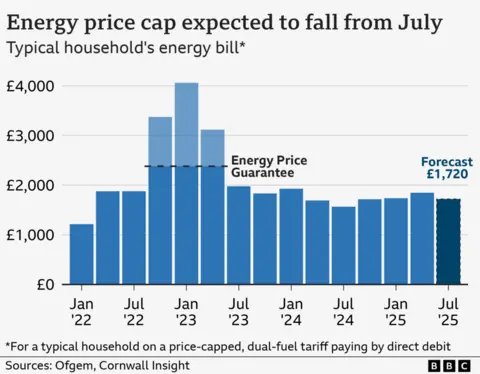Cost of living correspondent
 Getty Images
Getty ImagesEnergy regulator Ofgem is shortly expected to announce a fall in domestic gas and electricity prices for millions of households from July – the first drop for a year.
The regulator’s price cap, which is set every three months, affects the amount paid for energy by 22 million households in England, Scotland and Wales.
Analysts have forecast a fall of more than £100 in the annual bill for a home using a typical amount of gas and electricity.
Charities say cheaper bills would be welcome but many people still struggle to pay, and millions of customers collectively owe about £4bn to suppliers.
Ofgem will announce the price cap for July to the end of September at 07:00 BST. The price cap does not apply in Northern Ireland, which has its own energy market.
Summer relief
Although the cap changes every three months, the regulator illustrates the effect of this with the annual bill for a household using a typical amount of gas and electricity.
This typical household is assumed to use 11,500 kWh of gas and 2,700 kWh of electricity a year with a single bill for gas and electricity, settled by direct debit.
Analysts at the energy consultancy Cornwall Insight have forecast a drop in the annual bill of £129, a fall of nearly 7%.
The fall would mean a typical annual bill for a dual-fuel customer paying by direct debit would cost £1,720, down from the current level of £1,849.
It would also more than reverse the £111 increase in a typical bill under the current price cap, which came into force at the start of April.
Customers can also estimate their own potential saving by knocking 7% off their monthly direct debit.

However, prices would still be higher than a year earlier, and significantly above levels seen at the start of the decade.
High bills in recent years have also led to ballooning levels of customer debt to suppliers, with just under £4bn owed.
“The cost of living is still incredibly high, and many people, especially those who are vulnerable or have low incomes, are dealing with energy debt built up over the last few years of sky-high bills,” said Matthew Cole, chief executive of the Fuel Bank Foundation, a fuel poverty charity.
“A slight drop in prices won’t fix that. People are still being forced to make tough choices between topping up the meter or putting food on the table.”
Winter fuel payment row
The price cap announcement comes just two days after Prime Minister Sir Keir Starmer signalled a partial U-turn on cuts to winter fuel payments.
More than 10 million pensioners lost out on the payments, worth up to £300, when the top-up became means-tested last year.
However, Sir Keir told the Commons on Wednesday that the government wanted “more pensioners” to be eligible again.
It remains unclear how many will regain their entitlement for the payments, how that will be achieved, or when the changes will take effect.


